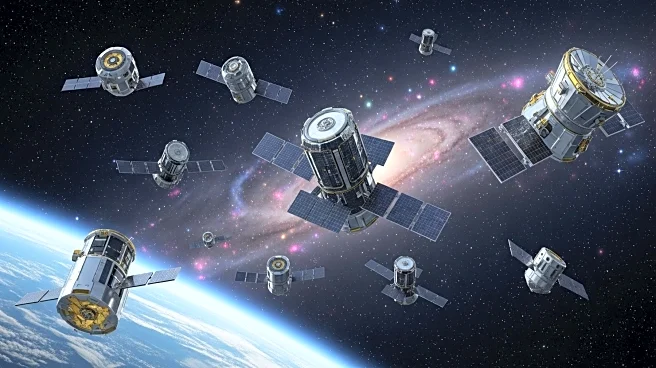What's Happening?
Amazon has launched 27 satellites as part of its Project Kuiper, marking a significant step in its competition with SpaceX's Starlink. The satellites were deployed using a ULA Atlas V 551 rocket from Cape Canaveral on September 25, 2025. This launch is part of Amazon's ambitious plan to establish a megaconstellation of approximately 3,200 satellites to provide global broadband internet. The project, announced in 2019, is a $10 billion initiative aimed at rivaling SpaceX's Starlink, which currently dominates the space-based internet market with over 8,300 satellites. Amazon's Kuiper constellation now totals 129 satellites in orbit, with plans to begin internet service once 578 satellites are operational. The company has secured 92 launch contracts across various providers, including ULA, Arianespace, Blue Origin, and SpaceX, to meet its FCC deadline of launching half of the planned satellites by July 2026.
Why It's Important?
The launch of Amazon's satellites is a critical development in the burgeoning space internet industry, which promises to revolutionize global connectivity. By entering this market, Amazon aims to provide broadband internet to underserved communities and compete directly with SpaceX's Starlink, which has already established a significant presence. The competition between these two giants could lead to improved services, lower costs, and expanded coverage for consumers worldwide. Additionally, Amazon's involvement in the space race highlights the increasing role of private companies in space exploration and technology, potentially driving innovation and economic growth in the sector.
What's Next?
Amazon plans to continue its aggressive launch schedule, with another Falcon 9 launch scheduled for October 1, 2025, to deploy 24 more Kuiper satellites. ULA is preparing additional Atlas V missions before transitioning to the Vulcan Centaur for future launches. The first Vulcan launch for Kuiper is tentatively slated for Q4 2025. As Amazon accelerates its satellite deployment, it aims to begin delivering internet service to initial customers by late 2025, expanding coverage as more satellites become operational. The company must maintain a rapid launch cadence to meet its FCC deadlines, and any delays in rocket availability could impact its deployment schedule.
Beyond the Headlines
Amazon's entry into the space internet market raises concerns about orbital debris and interference with astronomical observations, issues that regulators and astronomers are closely monitoring. The company has secured FCC approval for its orbital debris mitigation plan, but responsible operations will be crucial as more satellites join the crowded skies. The competition between Amazon and SpaceX also underscores the strategic importance of space technology in global communications and the potential for geopolitical implications as countries and companies vie for dominance in this new frontier.









